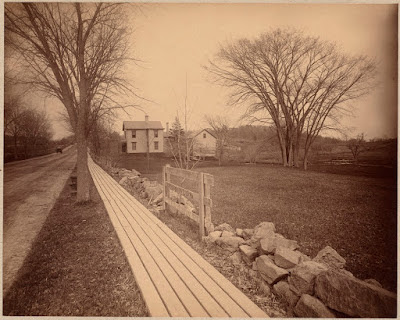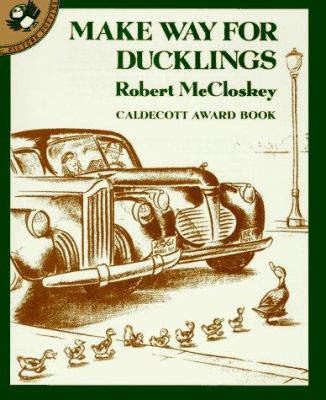 |
| August 16, 1919 |
August 15, 1869 - Town Meeting allocates funds for sidewalks
August 19, 1905 - Mosquito control effort
August 16, 1919 - A real-life Make Way for Ducklings
August 19, 1963 - Board of Selectmen rejects Inner Belt Plan
August 15, 1869
Town Meeting allocates funds for sidewalks
Town Meeting responded favorably to a report from a special committee and allocated $8,000 for a major sidewalk construction project in town. The expenditure represented the most comprehensive approach after years of piecemeal efforts at sidewalk construction.
"The condition of the sidewalks of the town being so bad [the report had said], your committee would urge that there be no further delay than is absolutely necessary, and recommend the immediate appropriation of eight thousand dollars, to be expended by the Selectmen in laying such walks as they shall deem best suited to the different streets, always remembering that a good sidewalk should protect from mud at all seasons of the year."
"Attention should be given first to the main thoroughfares leading to the centre of the village and the railroad stations [recommended the committee], laying it on one side of the street only, and, wherever it is practicable, on the south side of the street, that it may the better be kept free from snow and ice."
 |
| This 1887 photo shows a plank sidewalk laid by the town on Beacon Street, looking east from Englewood Avenue. |
Read more in The Long History of Wooden Sidewalks in Brookline
August 19, 1905
Mosquito control effort
Brookline's Board of Health announced that the town was more free of mosquitoes than it had been in years, thanks to determined eradication efforts. The approach, shared by the town and individual property owners, involved filling common breeding pools or sprinkling them with petroleum to suffocate young mosquitoes before they could mature.
A chapter -- "What New Orleans and Brookline Did" -- in a 1906 book on public health cited the town as a model for other communities to follow. Brookline's efforts, the book noted, had been motivated by three factors: 1) the presence of malaria in town; 2) the "torment" of mosquitoes in summers; and 3) "In certain parts of town the value of property was low because the number of mosquitoes was high."
 |
| Illustration from the 1906 public health book Town and City |
To implement this means of eradication (archaic by today's standards) the town, according to the 1906 book, "hired two laborers, a horse a wagon and an overseer and sent them off to fill the small ponds and oil the large ones of the town. Watering pots and hose sprinkled the oil though often all that was needed was to pour it on and stir up the water and let the oil do its own spreading."
August 16, 1919
A real-life Make Way for Ducklings
Two decades before the publication of Robert McCloskey's now classic Make Way for Ducklings, the Brookline Chronicle carried a story about a Brookline police officer holding up traffic on Beacon Street so a mother mallard could lead her brood of not-yet-flying ducklings across the busy road.
"At eight o'clock that morning [reported the paper] she set out on the long journey, followed by the nine little ones, then only three days old and so tiny as to be hardly distinguishable in the long grass."
"Up the bank they went, and down the nearby alley, and a few moments later the astonished gaze of the traffic officer stationed at the corner of Beacon and Carlton Streets beheld them preparing to cross the wide main thoroughfare. Much amused and greatly interested, he stopped all traffic on the busy street until the duck, quacking continuously, had conducted her brood safely to the other side."
Read the original story as it appeared in the Chronicle.
August 19, 1963
Board of Selectmen rejects Inner Belt Plan
Brookline's Board of Selectmen voted to reject a state plan for a four-lane double-deck bridge carrying part of the proposed I-695 highway through Cottage Farm and over the Charles River to Cambridge. The board proposed an underground tunnel as an alternative route through the neighborhood for the proposed new highway.
 |
| One of several proposals for the section of I-695 passing through Brookline between Roxbury and Cambridge. |
The vote was part of a long series of objections to the proposed "Inner Belt" highway. Opposition was particularly strong in Cambridge and in Roxbury and other parts of Boston that would have been even more affected by the proposed road. The project, seen as a more central alternative to the route 128 loop around Boston, was finally killed altogether in 1971.
--------------------------------------------------------------------
A clarification on last week's TWIBH: The item about the first Davis Cup competition in last Sunday's This Week in Brookline History should have noted that the Longwood Cricket Club, where the matches were held in 1900, was still in Boston at that time. The club moved to Chestnut Hill in Brookline and Newton in the 1920s.

No comments:
Post a Comment